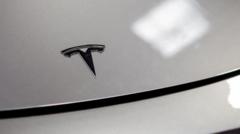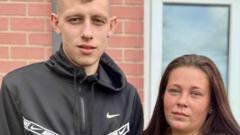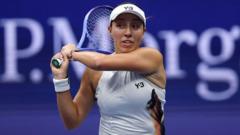Can Tesla Overturn the Verdict in Fatal Crash Case?

Published: 2025-08-29 18:10:18 | Category: technology
This article discusses Tesla's recent legal battle regarding a jury verdict that found the company partly responsible for a fatal crash in 2019, where a pedestrian was killed and another was severely injured. Tesla is seeking to overturn the jury's decision, arguing that the driver was at fault and challenging the substantial damages awarded to the victims. This case highlights ongoing concerns regarding the safety and reliability of Tesla's Autopilot technology.
Last updated: 26 October 2023 (BST)
Key Takeaways
- Tesla seeks to overturn a jury verdict regarding a 2019 crash in Florida.
- The crash resulted in one pedestrian's death and severe injuries to another.
- Tesla blames the driver, George McGee, for the accident.
- The jury awarded $243 million (£189 million) in damages, citing misrepresentation of Autopilot's capabilities.
- This case marks a significant moment in the scrutiny of autonomous driving technologies.
Overview of the Case
The incident at the heart of this legal dispute took place in 2019 when George McGee, driving a Tesla Model S, lost control of the vehicle, leading to a crash that tragically killed 22-year-old Naibel Benavides Leon and severely injured her boyfriend, Dillon Angulo. The jury found Tesla partly liable, focusing on the role of its Autopilot driver assistance software, which was alleged to have failed to prevent the accident.
Tesla's Response
In response to the jury's decision, Tesla has requested the federal court in Florida to either overturn the verdict or order a new trial, particularly contesting the substantial punitive damages awarded. The company argues that the responsibility for the crash lies with McGee, stating, "Auto manufacturers do not insure the world against harms caused by reckless drivers." This statement underscores Tesla's position that the actions of the driver, rather than the technology, were to blame for the incident.
Legal Arguments Presented
Tesla's legal team contends that the $243 million damages award is unreasonable and contradicts common sense. They assert that the jury was overwhelmed by irrelevant evidence that may have influenced their decision, including material related to Elon Musk, Tesla's CEO. Tesla claims that such evidence was prejudicial and should not have been considered during the trial.
The Victims' Perspective
Brett Schreiber, representing the victims, argues that Tesla's efforts to overturn the verdict illustrate a disregard for the consequences of their technology. He maintains that while the jury recognised shared responsibility, the failures of the Autopilot system and the misrepresentation of its capabilities played a crucial role in the crash. Schreiber expressed confidence that the court would uphold the original verdict, highlighting the importance of accountability for manufacturers in the face of technological failures.
The Incident Details
During the trial, it was revealed that McGee had dropped his phone just before the crash, causing him to lose focus on the road. His testimony indicated that he believed the Autopilot system would assist him in managing unexpected situations, a belief that ultimately proved misguided. Neither McGee nor the Autopilot activated the brakes in time to avert the collision with the victims, which raises questions about the reliability of the technology.
Insurance and Liability in Autonomous Driving
This case broadens the discussion about liability in accidents involving autonomous vehicles. Traditionally, auto manufacturers have been held accountable for defects in their products. However, as driver assistance technologies like Tesla's Autopilot become more prevalent, the lines of responsibility may blur. Tesla's assertion that they should not be liable for reckless driving echoes a sentiment that could challenge existing legal frameworks.
Previous Legal Precedents
This case is not an isolated incident; it is part of a broader trend of litigation surrounding Tesla's Autopilot technology. In a previous case, Tesla settled a lawsuit related to a 2018 crash that resulted in the death of an Apple engineer. Additionally, a California state jury recently ruled that Tesla was not at fault in a case linked to a fatal incident involving its Autopilot system. These developments highlight the ongoing scrutiny faced by Tesla and its technologies.
What Happens Next?
As Tesla awaits the court's decision on their appeal, the case continues to draw attention to the potential risks associated with autonomous driving technologies. The outcome may set significant legal precedents regarding manufacturer liability, particularly in cases involving advanced driver assistance systems. With increasing adoption of such technologies, the industry may need to recalibrate its approach to safety and accountability.
Future Implications for Tesla and the Auto Industry
The outcome of this case could have lasting effects on Tesla's reputation and its financial standing. A ruling against Tesla may lead to increased regulatory scrutiny and influence future litigation involving other manufacturers. Moreover, it could prompt a reevaluation of how technology is marketed and perceived by consumers, particularly regarding the capabilities and limitations of autonomous systems.
Conclusion
The ongoing legal battle between Tesla and the victims of the 2019 crash underscores the complexities of liability in the age of autonomous vehicles. As the court deliberates Tesla's appeal, the case serves as a critical reminder of the potential dangers associated with advanced driver assistance technologies and the responsibility that manufacturers hold in ensuring their safety. How this case unfolds may shape the future of both Tesla and the wider automotive industry as it navigates the evolving landscape of autonomous driving.
FAQs
What was the outcome of the original trial?
The jury found Tesla partly liable for a 2019 crash that killed a pedestrian and awarded the victims £189 million in damages, citing misrepresentation of the Autopilot software's capabilities.
Why is Tesla appealing the verdict?
Tesla is appealing the verdict on the grounds that the driver was primarily responsible for the crash and that the damages awarded were excessive and based on irrelevant evidence.
What are the implications of this case for autonomous vehicles?
This case raises critical questions about liability in accidents involving autonomous vehicles, potentially influencing future legal standards and consumer perceptions of driver assistance technologies.
How has Tesla handled previous legal challenges regarding Autopilot?
Tesla has faced multiple lawsuits related to its Autopilot technology, including previous settlements and a recent case where a jury found it not at fault in a fatal incident.
What is Tesla's position on the Autopilot system's reliability?
Tesla maintains that its Autopilot system is designed to assist drivers but emphasises that drivers remain responsible for their vehicles and should not rely solely on technology.



